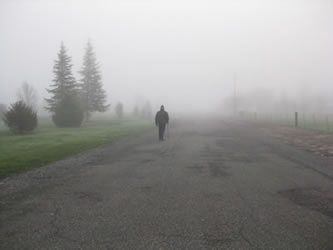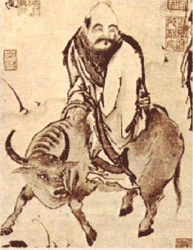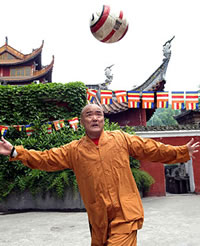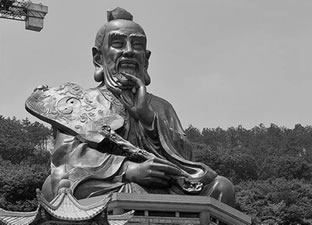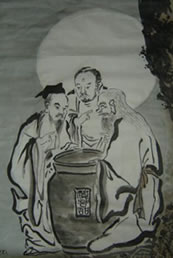Our front porch before Halloween Day.
Notice the five spherical white spectral (ghostly) visitors coming to "trick or treat" at our front door.
Red Bluff, California, 1998-2017
"To all the ancient ones from their houses, the Old Ones from above and below. In this time the Gods of the Earth touch our feet, bare upon the ground. Spirits of the Air whisper in our hair and chill our bodies, and from the dark portions watch and wait the Faery Folk that they may join the circle and leave their track upon the ground. It is the time of the waning year. Winter is upon us. The corn is golden in the winnow heaps. Rains will soon wash sleep into the life-bringing Earth. We are not without fear, we are not without sorrow...Before us are all the signs of Death: the ear of corn is no more green and life is not in it. The Earth is cold and no more will grasses spring jubilant. The Sun but glances upon his sister, the earth..... It is so....Even now....But here also are the signs of life, the eternal promise given to our people. In the death of the corn there is the seed--which is both food for the season of Death and the Beacon which will signal green-growing time and life returning. In the cold of the Earth there is but sleep wherein She will awaken refreshed and renewed, her journey into the Dark Lands ended. And where the Sun journeys he gains new vigor and potency; that in the spring, his blessings shall come ever young!"
- Two Samhain Rituals, Compost Coveners, 1980
Red Bluff, California, 1998-2017
"To all the ancient ones from their houses, the Old Ones from above and below. In this time the Gods of the Earth touch our feet, bare upon the ground. Spirits of the Air whisper in our hair and chill our bodies, and from the dark portions watch and wait the Faery Folk that they may join the circle and leave their track upon the ground. It is the time of the waning year. Winter is upon us. The corn is golden in the winnow heaps. Rains will soon wash sleep into the life-bringing Earth. We are not without fear, we are not without sorrow...Before us are all the signs of Death: the ear of corn is no more green and life is not in it. The Earth is cold and no more will grasses spring jubilant. The Sun but glances upon his sister, the earth..... It is so....Even now....But here also are the signs of life, the eternal promise given to our people. In the death of the corn there is the seed--which is both food for the season of Death and the Beacon which will signal green-growing time and life returning. In the cold of the Earth there is but sleep wherein She will awaken refreshed and renewed, her journey into the Dark Lands ended. And where the Sun journeys he gains new vigor and potency; that in the spring, his blessings shall come ever young!"
- Two Samhain Rituals, Compost Coveners, 1980
"Tonight as the barrier between the two realms grows thin,
Spirits walk amongst us, once again.
They be family friends and foes,
Pets and wildlife, fishes and crows.
But be we still mindful of the Wee Folke at play,
Elves, fey, brownies, and sidhe.
Some to trick, some to treat,
Some to purposely misguide our feet.
Stay we on the paths we know
As planting sacred apples we go.
Spirits walk amongst us, once again.
They be family friends and foes,
Pets and wildlife, fishes and crows.
But be we still mindful of the Wee Folke at play,
Elves, fey, brownies, and sidhe.
Some to trick, some to treat,
Some to purposely misguide our feet.
Stay we on the paths we know
As planting sacred apples we go.
This Feast I shall leave on my doorstep all night.
In my window one candle shall burn bright,
To help my loved ones find their way
As they travel this eve, and this night, until day.
Bless my offering, both Lady and Lord
Of breads and fruits, greens and gourd."
- Akasha, Samhain Ritual
In my window one candle shall burn bright,
To help my loved ones find their way
As they travel this eve, and this night, until day.
Bless my offering, both Lady and Lord
Of breads and fruits, greens and gourd."
- Akasha, Samhain Ritual



